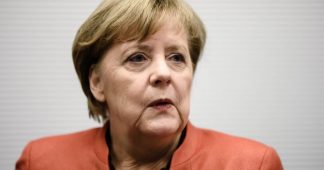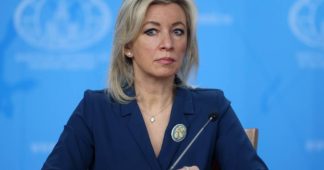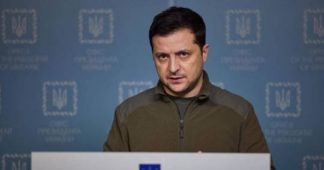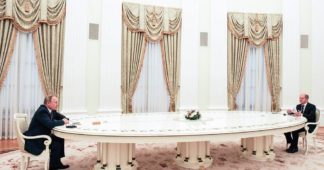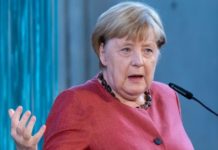Ammar Anwer/ew
Oct 06,2025
Poland and the Baltic states rejected calls for joint EU talks with Moscow over Ukraine a year before Russia launched its full-scale invasion, due to concerns that the bloc would not agree on a common policy, former German Chancellor Angela Merkel has said.
Speaking to the Hungarian media outlet Partizán on Friday, Merkel said that in June 2021 she and French President Emmanuel Macron were looking at ways to hold direct talks with Russian President Vladimir Putin’s over what they saw as his declining commitment to the 2015 Minsk agreements.
Merkel, who retired as chancellor in 2021 after 16 years in power, had been a key mediator of the Minsk agreements — a set of international accords signed in 2014 and 2015 intended to end the conflict in eastern Ukraine between the Ukrainian armed forces and Russia-backed separatists.
Under the Minsk accords, Ukraine was supposed to observe a ceasefire, withdraw heavy weapons from the front line and enact constitutional or legislative reforms to grant a special status to parts of the eastern Donbas region, while the separatists and Russia were required to pull back their forces and respect Ukraine’s sovereignty.
The deals, negotiated in the Belarusian capital, were reached under the so-called Normandy Format, which involved Ukraine, Russia, Germany and France.
Opposition from Poland and Baltics
Merkel told Partizán: “In June [2021], I felt that Putin was no longer taking our agreement seriously. That’s why I wanted a new format then with President Macron for the EU to negotiate directly with Putin.
“This was not supported by some, especially the Baltic states, but Poland was also opposed, because they feared we would not be able to develop a common policy towards Russia.”
According to Merkel, there was no willingness within the bloc to agree on such a common policy, and her proposal was ultimately shelved.
“Then I left office and Putin’s war began,” she added.
“We now need to look at how we can best ourselves for peace by providing a real deterrent while also supporting Ukraine,” Merkel continued.
Reflecting on the Minsk agreement, Merkel said that while the treaty “was not perfect” and Russia “never truly adhered to it,” it gave Kyiv between 2015 and 2021 a chance to “strengthen itself and improve its defenses.”
Moscow has repeatedly blamed Ukraine and the West for the failure of the Minsk agreements, claiming that Berlin and Paris did little or nothing to persuade Kyiv to fulfill its obligations under the deal.
Sikorski’s response
Polish Foreign Minister Radosław Sikorski hit back on Monday, saying Merkel’s claim that Warsaw opposed such talks was “as true as what [Merkel] said in her memoirs, that nobody from Central Europe protested against Nord Stream.”
“Look at the German government’s reaction to what I said in 2007 about how we don’t like agreements made over our heads, so the Chancellor must have forgotten how her own government reacted to our protests,” he added.
Poland’s opposition to Nord Stream
The Nord Stream pipelines, built to deliver Russian gas directly to Germany via the Baltic Sea, were long opposed by Poland for what it argued would increase Europe’s dependence on Moscow. The first line was completed in 2011.
Kyiv has said that Russian gas revenues helped finance the Kremlin’s war in Ukraine. Since Russia’s 2022 invasion, Berlin has acknowledged that its reliance on Russian energy was “a mistake” and has sought to diversify supply routes.
Merkel stepped down as chancellor in late 2021, just months before Russia launched its full-scale invasion of Ukraine in February 2022.
We remind our readers that publication of articles on our site does not mean that we agree with what is written. Our policy is to publish anything which we consider of interest, so as to assist our readers in forming their opinions. Sometimes we even publish articles with which we totally disagree, since we believe it is important for our readers to be informed on as wide a speCtrum of views as possible.
